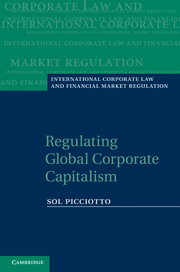Book contents
- Frontmatter
- Contents
- Preface
- Acknowledgements
- Table of cases
- Abbreviations and acronyms
- 1 Transformations of global governance
- 2 Liberal internationalism: strengths and limits
- 3 From interdependence to fragmentation
- 4 Corporations and competition
- 5 Corporate rights and responsibilities
- 6 International taxation
- 7 Regulation of international finance
- 8 The WTO as a node of global governance
- 9 Intellectual property rights
- 10 Law and legitimacy in networked governance
- Bibliography
- Index
9 - Intellectual property rights
Published online by Cambridge University Press: 05 June 2012
- Frontmatter
- Contents
- Preface
- Acknowledgements
- Table of cases
- Abbreviations and acronyms
- 1 Transformations of global governance
- 2 Liberal internationalism: strengths and limits
- 3 From interdependence to fragmentation
- 4 Corporations and competition
- 5 Corporate rights and responsibilities
- 6 International taxation
- 7 Regulation of international finance
- 8 The WTO as a node of global governance
- 9 Intellectual property rights
- 10 Law and legitimacy in networked governance
- Bibliography
- Index
Summary
IPRs are a very peculiar institution. They are a grant by the state of exclusive rights over creations and inventions of the human mind, providing a monopoly to exploit intangible assets. The artificial scarcity created by state-enforced IPRs is in many ways inappropriate for knowledge-based assets, since they do not deplete when shared. Indeed, both new technology and artistic and literary works provide the greatest social benefits by being used as widely as possible. Wide availability enhances both pleasure and profit, since diffusion also reduces the costs of further innovation. This is also true from the viewpoint of originators, who only rarely have an interest in concealing their creations. Originators also have other concerns, which can be protected in various ways, in particular in obtaining recognition for their contribution, and safeguarding the integrity of their works (sometimes referred to as ‘moral’ rights).
Economists have therefore always had difficulty finding adequate justifications for this state grant of monopoly rights. The common rationale refers to the need for an economic incentive to encourage innovation. However, closer examination of the social and scientific, as well as economic, processes of innovation and creativity shows that many of the justifications for IPRs are weak at best (Macdonald 2002; Hope 2008: ch. 3). Human creativity has many and varied wellsprings, and is mainly a social rather than a solitary activity. But the main economic spur to innovation is the ‘first-mover’ advantage, which ensures a higher rate of profit for leading-edge firms until an innovation becomes generalized.
- Type
- Chapter
- Information
- Regulating Global Corporate Capitalism , pp. 382 - 440Publisher: Cambridge University PressPrint publication year: 2011

